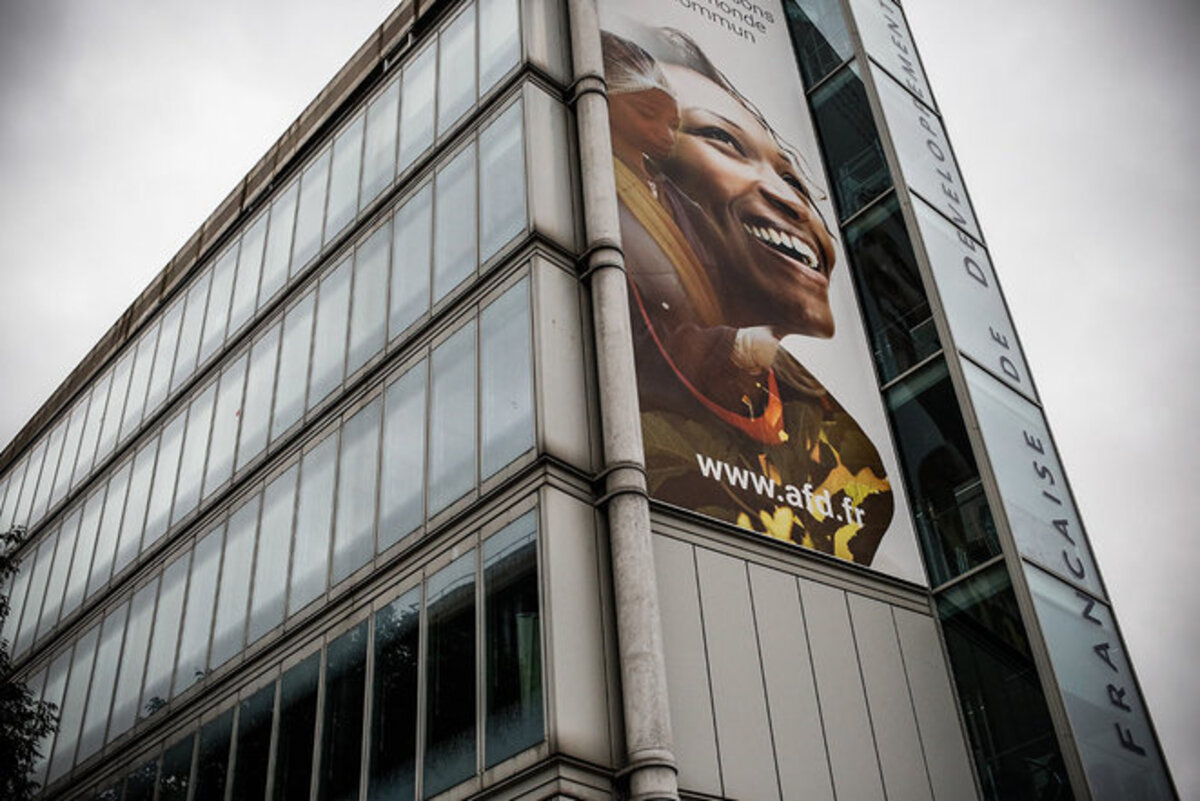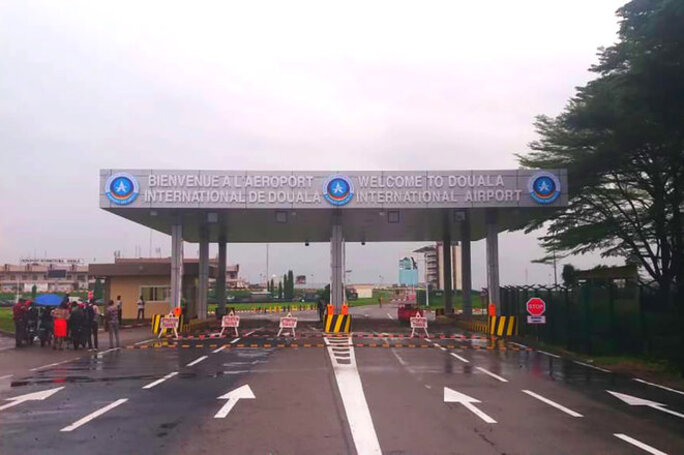Created in 1941 during WWII by General Charles de Gaulle’s government in exile in London, initially as a treasury institution called the Central Fund of Free France, later responsible for funding the development of French overseas territories, the renamed French Development Agency (AFD) is today the public body through which France provides financial aid to developing countries via specific projects.
With a capital of 953 million euros provided by the French state, the AFD borrows, at low interest rates, billions of euros on the financial markets which it in turn lends to private and public institutions in developing countries. Of the 12 billion euros it ploughed into projects in 2020, loans accounted for 87% of the sum. The remainder is made up of donations, mostly to projects in Africa.
The projects it funds are diverse in both scale and nature; it is involved in the building of a school in Gabon, while in Cameroon it funded repairs to a bridge. In Mali, it is helping with the digging of a village water well, and in Niger it is supporting a campaign to sensibilize the population to the problems of violence against women.
On December 17th 2020, during a “presidential council” meeting held with his foreign affairs and economy ministers on the subject of foreign aid, French President Emmanuel Macron announced that his country would “give back to African countries the means to provide aid for their populations”. It is the AFD which is tasked with investing the billions of euros to – as officially declared in the agency’s missions – “improve the living conditions of populations”.
The AFD certainly contributes to that goal. It supports thousands of projects which meet the aim of contributing to reducing inequalities around the world. But other projects the agency funds stand accused of having a less noble character, as detailed in a series of investigations by Mediapart in partnership with online newsroom Disclose which unveils the downside of France’s vaunted policies to help international development. This includes projects involving the forced displacements of people, deforestation, the support of armed forces suspected of abuses, all to a backdrop of opacity surrounding a number of its activities.

Enlargement : Illustration 1

After a study of the European Union’s register of public procurement contracts, this investigation was able to analyse the data of 209 tenders issued by the AFD between 2015 and 2019, and which represented a total value of 249 million euros. The vast majority of these funds were for projects in African countries situated in France’s zone of influence on the continent, including Gabon, Senegal, Cameroon and Ivory Coast.
According to the AFD, the attribution of its funds is “not conditioned by the selection of French companies”. However, a study of available information for the period 2015-2019 shows that in the great majority of issued tenders, it was companies based in France which won them – a total of 320 public procurement contracts out of 495. Questioned by Mediapart and Disclose, Bertrand Walckenaer, the deputy head of the AFD, dismissed the suggestion that the agency favours French corporations, and said their dominance was notably explained by the AFD’s “level of requirements” concerning “social responsibility and environmental standards”.
This investigation also found that, among those contracts where the company chosen is identified in the official data, the ten companies which have won the most contracts are all French. Among these beneficiaries of the AFD tenders is a subsidiary of French water and waste management company Suez Environnement, along with a subsidiary of French multinational energy utility group Engie, and also a private security firm, Amarante International, with close links to the French intelligence services. According to the AFD, the latter provides “services aimed at ensuring the security” of its agents in France and in countries where it intervenes.
As for the contracts for loans provided by the AFD to countries and local authorities, the agency refused to publicly divulge details of these for what it said were reasons of banking secrecy.
One of these projects concerns the renovation of the airport of Douala, the economic capital of Cameroon, whose president, Paul Biya, has been in power since 1982. In 2016, the AFD provided Cameroon’s publicly-owned airport management company, Aéroports du Cameroun, with a loan of 46 million euros for repairs and rebuilding work on the airport’s terminal and its runway, along with lesser renovations. Two French companies were chosen to lead the work; Sogea Satom, a subsidiary of French construction and concessions giant Vinci, and Razel-Bec, a civil engineering subsidiary of French construction group Fayat. The value of the contracts totalled 24.4 million euros.

Enlargement : Illustration 2

Two years later, 15 airlines, including Air France, jointly wrote to the managing director of Aéroports du Cameroun, in which they complained that the Douala airport passenger terminal was “repulsively dirty”, with “worn paintwork”, “incoherent electrical connections” and an “inextricable forest of cables” that hung across the outside facades. But the “most preoccupying” problem, wrote the airlines, concerned the safety of aircraft. “The tarmacs soaking in oil no longer have the initial resistance and are rapidly deteriorating,” they noted, adding that there was “never one day that passes without a breakdown or shortage of equipment”. Some of the planned work has since been carried out, but the passenger terminal reportedly remains in a very poor state.
The AFD, citing reasons of banking secrecy, refuses to reveal how the millions of euros handed to Aéroports du Cameroun were used, what contractual guarantees were in place, and whether an audit for the project had been carried out.
A request made for access to the relevant documents in March 2018 by journalist Emmanuel Freudenthal, who was at the time a contributor to Disclose, was turned down by the agency for reasons of banking secrecy. Three months later, after the request was submitted for arbitration by France’s public commission for arbitrating access to administrative documents, the CADA, it was again refused on the basis of banking secrecy.
The case was subsequently brought before the Paris administrative court, and at a hearing in February this year it ruled that some of the documents Freudenthal had requested access to were protected by banking secrecy. As for the remaining documents in his request, the AFD’s lawyers announced at the last minute that these did not in fact exist.
The court ordered Freudenthal to pay 1,000 euros towards the AFD’s legal costs.
The secrecy that surrounds the use of the AFD’s funds is well established, and was a subject of concern in a February 2020 report by the French national audit office, the Cour des comptes, which notably underlined the absence of transparency in the “procedures, impact studies, public enquiries, and disbursements” of the agency.
Publish What You Fund is a UK-based NGO which produces a yearly ‘Aid Transparency Index’ assessing the openness of information provided by aid donors around the world. In 2020, the index ranked the AFD in 30th position out of 47 aid donors, placing it in a category described as “fair” (a middling category among five others, one below “good” and just above “poor”. While that represented an improvement on its score in the 2014 index, which placed the AFD in 44th position (out of 68), in the category “poor”, in reality few changes are visible.
The “Open Data” pages on the AFD website, and which the agency presents as serving to render its activities “more accessible and more legible”, contains regularly incomplete descriptions of projects it is involved in, along with incoherent dates, while other information is simply missing. Questioned about this, the AFD replied that, “It concerns technical problems that we are endeavouring to settle in the shortest time”.
This lack of transparency, reinforced by the notion of banking secrecy, has allowed the AFD to fund projects that are in total contradiction with its stated objectives, and also those of its subsidiary Proparco, which is dedicated to providing aid in the private sector. This was the case concerning 87 projects in which the agency has been involved since 2010. These include a factory producing nitrogen-containing fertilizer in Nigeria, the intensive production of flowers in Kenya, and palm oil production. All were linked to intensive agriculture, according to this investigation’s comparative study of publicly available data from the AFD and its subsidiary against the findings of a report into French financing of agri-industry activities compiled by Oxfam France and French NGO CCFD-Terre solidaire et Action contre la faim.
Since the French parliament’s adoption in 2014 of legislation setting out “the orientation of [France’s aid for] development and international solidarity” (LOPDSI), the country’s public aid contribution is supposed to promote “durable development in developing countries”. Investigations by Mediapart and Disclose in the Democratic Republic of the Congo (DRC) demonstrates that that objective is far from respected; almost 30 million euros of aid was invested, at a loss, in a DRC palm oil production plant, whose management have been accused of mistreatment and negligence towards their employees.
Meanwhile, although the AFD promotes constructive dialogue between employers and employees in foreign projects it funds, notably in Africa, it has manifestly failed to apply such dialogue within its own organisation, which employs around 2,700. Staff and union officials at its Paris headquarters have denounced a “poisonous” atmosphere with a repeated breakdown of talks over the management’s attempt to reform the terms of working contracts, notably to do away with length of service bonuses, a reduction in severance payments, and a widening of pay gaps.
-------------------------
If you have information of public interest you would like to pass on to Mediapart for investigation you can contact us at this email address: enquete@mediapart.fr. If you wish to send us documents for our scrutiny via our highly secure platform please go to https://www.frenchleaks.fr/ which is presented in both English and French.
-------------------------
- The original French version of this report can be found here.
English version by Graham Tearse


